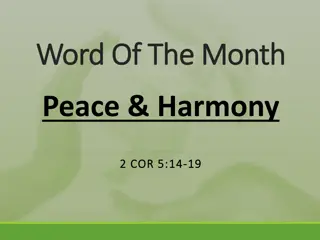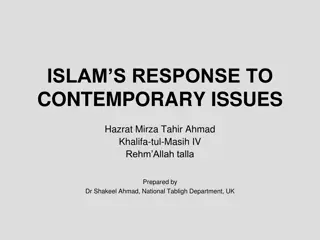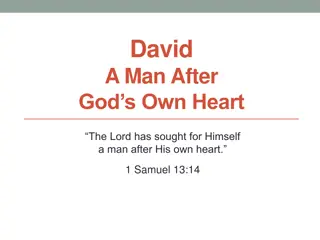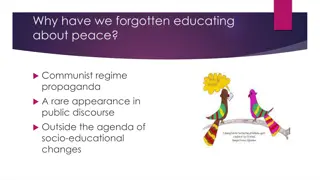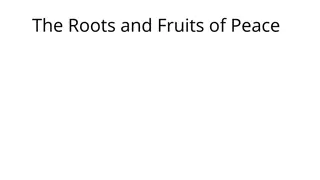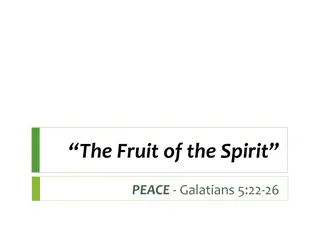Peace With God
In Romans, Paul explains the significance of justification by faith, outlining the believer's access to God, assurance, indwelling, and preservation. Justification and sanctification are distinguished, emphasizing our standing before God and state on earth. Through faith, we find peace with God and rejoice in the hope of glory. Explore Romans 5 for insights on divine justification.
Download Presentation

Please find below an Image/Link to download the presentation.
The content on the website is provided AS IS for your information and personal use only. It may not be sold, licensed, or shared on other websites without obtaining consent from the author.If you encounter any issues during the download, it is possible that the publisher has removed the file from their server.
You are allowed to download the files provided on this website for personal or commercial use, subject to the condition that they are used lawfully. All files are the property of their respective owners.
The content on the website is provided AS IS for your information and personal use only. It may not be sold, licensed, or shared on other websites without obtaining consent from the author.
E N D
Presentation Transcript
Peace With God Peace With God Chapter 5:1 Chapter 5:1 11 11 Week 9 Week 9 17 March 2021 17 March 2021
ROMANS Background: In presenting his case, Paul has proved that the whole world is guilty before God, and that no one can be saved by religious deeds, such as keeping the Law. Paul has explained that God s way of salvation has always been by grace, through faith (Eph. 2:8 9), and he has used Abraham as his illustration.
ROMANS Background: If the reader stopped here, he would know that he needed to and could be saved. But there is much more the sinner needs to know about justification by faith. Can he be sure that it will last? How is it possible for God to save a sinner through the death of Christ on the cross? Romans 5 is Paul s explanation of the last two words in Romans 4: our justification. Here in Ch5, Paul explained two basic truths: the blessings of our justification (1 11), and the basis for our justification (12 21).
ROMANS 5:1 11 Overview of Ch 5 In chapter 5, Paul talks about the joy that comes from faith. He lists fiveresults of divine justification: The believer has peace with God (5:1) The believer has access to God (5:2) The believer has assurance from God (5:3 4) The believer is indwelt by God (5:5) The believer is preserved in God (5:6 11)
ROMANS 5:1 11 Overview of Ch 5 Keep in mind that justification is God s declaration that the believing sinner is righteous in Christ. It is righteousness imputed, put to our account. Sanctification is righteousness imparted, worked out in and through our lives by the Spirit.
ROMANS 5:1 11 Overview of Ch 5 Justification is our standing before God; sanctification is our state here on earth before others. Justification never changes; sanctification does.
ROMANS 5:1 2 1Therefore, being justified by faith, we have peace with God through our Lord Jesus Christ: 2By whom also we have access by faith into this grace wherein we stand, and rejoice in hope of the glory of God.
ROMANS 5:1 2 To prepare his readers for the rest of the journey, Paul directs us to stop for a moment to consider where we are. We have now believed! This step is monumental in the life of a believer, and if we don t pause to appreciate its significance, the rest of our journey will remain a mystery. Paul takes us by the shoulders, as it were, turns us around to lookback down the road we traveled, and says, Therefore, having been justified by faith, we have peace with God through our Lord Jesus Christ (5:1).
ROMANS 5:1 2 Peace with God. There s move relief in those threewords than any others. The more we comprehends the danger of God s fearsome wrath, the more we experience the incredible relief of having peace with God. Peace does not refer to inner tranquility, although that s part of the relief we feel. Peace refers to our no longer being subject to God s wrath because of sin.
ROMANS 5:1 2 The death of Jesus satisfied our debt of sin and set aside the resulting hostility so that God and people are no longer divided by rebellion, but reconcile in peace. And the resulting relief is indescribable. Anyone who has spent his or her life trying to earnGod s pleasure or trying to accumulate enough good deeds to escape hell understands the joy of the words Peace with God.
ROMANS 5:1 2 The problem with trying to earnone s way out of debt to God is that we can never know how much is enough. Ask most people, Are you going to heaven after you die? and most will answer, I hope so. Those who trust religion to save them, if they take it seriously, must remain in a constant state of terror, knowing that onlydeath will solve the mystery of their eternal destiny and that their fate might be eternal suffering.
ROMANS 5:1 2 Paul called the experience of receiving God s grace through faith and the resulting peace an introduction. The Greek word is rendered access or admission. That is, the process of being ushered into the court of a king and then announced and given the right or opportunity to address the ruler. Paul used the same term to describe prayer for the Christian > According to the eternal purpose which he purposed in Christ Jesus our Lord: 12In whom we have boldness and access with confidence by the faith of him (Eph. 3:11-12).
ROMANS 5:1 2 Paul concludes this introductory sentence with the phrase, and we exult [rejoice] in hope of the glory of God, which uses three important terms worth studying Exult is best rendered to mean to boast. Not a negative behavior. But the boasting of believers is inherently humble because they do not have any confidence in their own goodness; instead, they express complete confidence in the free gift of grace.
ROMANS 5:1 2 Hope is best rendered to mean an assured expectation. Paul uses this term in a very specific way to describe the future day when Jesus returns to rule the world and renovate it to His liking. Glory is best rendered to mean appearance or manifestation. Glory refers to the state of things as God desire them. God triumphs over evil, justice prevails, sin has no place, and everything exists in harmony with His holy character.
ROMANS 5:3 4 Justification is no escape from the trials of life. In this world ye shall have tribulation (John 16:33). But for the believer, trials work for him and not against him. No amount of suffering can separate us from the Lord (Rom. 8:35 39); instead, trials bring us closer to the Lord and make us more like the Lord. Suffering builds Christian character. The word experience means character that has been proved.
ROMANS 5:3 4 The sequence is: tribulation patience experience (proven character) hope. Our English word tribulation comes from a Latin word tribulum. In Paul s day, a tribulum was a heavy piece of timber with spikes in it, used for threshing the grain. The tribulum was drawn over the grain and it separated the wheat from the chaff. As we go through tribulations, and depend on God s grace, the trials only purify us and help to get rid of the chaff.
ROMANS 5:3 4 The word for tribulation is often translated to pressure or suffering. Such suffering comes in all shapes and sizes. Nevertheless, because we have been ushered into a completely new manner of life, we can live with joyful confidence in suffering under pressure, through tribulation. How do we come by this supernatural ability? We gain the ability to rejoice under pressure through a carefully monitored training program directed by the Lord Himself. Paul described this program a chain reaction in which one phase leads to another, giving us joy despite our circumstances.
ROMANS 5:3 4 Tribulation brings patience. That is, perseverance. Naturally, when the pressure builds, we should take reasonable measures to relieve the discomfort. When we cannot avoid the suffering, choose to endure and to do so with graceful and calm dignity. Patience works experience. That is, perseverance brings about proven character or tested worth. This can also be thought of as triumphant fortitude which comes as the trials of life become instruments in the hand of Holy Spirit.
ROMANS 5:3 4 Experience works hope. That is, assured expectation, the certainty of a promised outcome. We experience this kind of hope when we overcome insurmountable odds to achieve victory and success. Throughout the ordeal, we observe without anxiety; we endure setbacks without panic. This is a kind of hope that cannot disappoint, because we have an assured outcome.
ROMANS 5:5 To provide the assurance we need, Paul introduces twogreattruths for the first time in the letter to the Romans: the great love of God and the indwelling of the Holy Spirit. We learned of God s wrath in 1:18-32; here we discover that those who now have peace with God can experience His love. His Spirit fills, transforms, and empowers us. He provides strength in our weakness, wisdom in our foolishness, love in our doubt, and evidence in our despair. The Holy Spirit living within us is our ever-present guarantee of future victory.
ROMANS 5:5 A believer s hope, since it is centered in God and His promises, does not disappoint him. Disappoint means put to shame because of disappointment in unfulfilled promises. The reason this hope (resulting finally from affliction) does not disappoint is that God has poured out His love into our hearts. God s love, so abundant in believer s hearts, encourages them on in their hope.
ROMANS 5:5 And this love is poured out by (or through) the Holy Spirit, whom He has given us. The Holy Spirit is the divine Agent who expresses to a believer the love of God. That is, God s love for him. The reality of God s love in a believer s heart gives the assurance, even the guarantee, that the believer s hope in God and His promise of glory is not misplaced and will not fail.
ROMANS 5:6 8 To illustrate our continuing need for grace and God s faithfulness in providing it, Paul retraced the steps of the gospel. In doing so, he stresses the fact that nothing in us deservedsaving, yet Christ died for us. How remarkable it is when one good person sacrifices his or her own life to save that of another good person. Most of us can identify with that kind of selflessness and hope to have similar courage if called upon to do the same.
ROMANS 5:6 8 But who would volunteer to take the place of a serial killer on death row? Who would give his or her own life to save that of a Hitler or Stalin?. Jesus Christ did. Note the verbs demonstrates and died. Normally, we would expect bothverbs to be past tense . . . Paul uses this unexpected turn of tenses to make an important point. We weren t what we should have been before we were saved, and we aren t what we should be now.
ROMANS 5:6 8 The gospel affirms that God demonstrates ( keeps on showing ) His own love for us in this: While we were still sinners, Christ died for us ( in our place ). Though a few people might possibly be willing to die to save the lives of good people, though that is rare, Christ went well beyond that. Christ died in the place of the powerless ( feeble, v6), the ungodly (v6), sinners (v8), and even His enemies (5:10).
ROMANS 5:9 The phrase much more then indicates that what follows is even more overwhelming and significant than what has preceded, astounding and wonderful as that is. Having been justified by His blood refers to the initial aspect of salvation, which for believers is past. In light of the fact that we already have been justified, Paul is saying, we are assured of being saved from the wrath of God through Jesus Christ.
ROMANS 5:9 Because of Christ s death, we (by grace, through faith) have been declared just by the Judge of heaven. We no longer have to fear His wrath. We are no longer subject to punishment. Christ s sacrifice paid our debt for sin not only our sins in the past but also those we will certainly commit in the future. We have not only escaped God s wrath at the final judgment after death; we are not subject to His wrath during our lifetime.
ROMANS 5:9 Paul wrote all of this to support his opening statement in 5:1 > Therefore being justified by faith, we have peace with God through our Lord Jesus Christ. The death and resurrection of Jesus Christ has usheredus into a completely new territory called grace, in which we have the opportunity to thrive according to a completely different perspective.
ROMANS 5:10 11 10For if, when we were enemies, we were reconciled to God by the death of his Son, much more, being reconciled, we shall be saved by his life. 11And not only so, but we also joy in God through our Lord Jesus Christ, by whom we have now received the atonement.
ROMANS 5:10 11 But that s not all. As if peace with God freedom from His wrath were not enough, there s more. Much more. The death of God s Son on behalf of humankind is only part of the story. Christ not only died, he rose again! His death stripped away the condemnation of death; His resurrection gives us abundant, eternal life. The work of reconciliation is complete! The gaping chasm that stood between God and us has been permanently bridged by Jesus Christ.
Jesus Christ Jesus Christ The Work of Reconciliation
ROMANS 5:10 11 Paul s use of the term saved includes far more than preservation from the torments of hell. It means preservation from all things that are opposed to God, including any future sin that threatens to keep us from enjoying our new life in the territory called grace. Christ not only died, he rose again! His death stripped away the condemnation of death; His resurrection gives us abundant, eternal life.
ROMANS 5:10 11 Mature believers experience a kind of joy that transcends all other considerations because it is anchored in their peace with God (5:1), their reconciled relationship with the Almighty. They live with joyful confidence despite the afflictions of a fallen world, despite the physical consequences of past sin, even despite their failure to live as they ought. Things are not yet as they should be.
ROMANS 5:10 11 Not if, but since . . . we were God s enemies, Christ was able by His death to reconcileus to God. Certainly now that we are God s children, the Savior can keep us by His living power (5:10). The assurance and guarantee of it all is the fact that through Christ, we have now received the reconciliation or the atonement (5:11). Since God has reconciled godless enemies to Himself, we should also rejoice in God and enjoy that peace with God.
NEXT CLASS 24 March 2021 Before next class, read the below chapter in the Before next class, read the below chapter in the KJV and in one other versions of the Bible, i.e., KJV and in one other versions of the Bible, i.e., NKJV, NRSV, NIV, CEV, etc NKJV, NRSV, NIV, CEV, etc Read Chapter 5 and 6 Focus on verses 5:12 21









